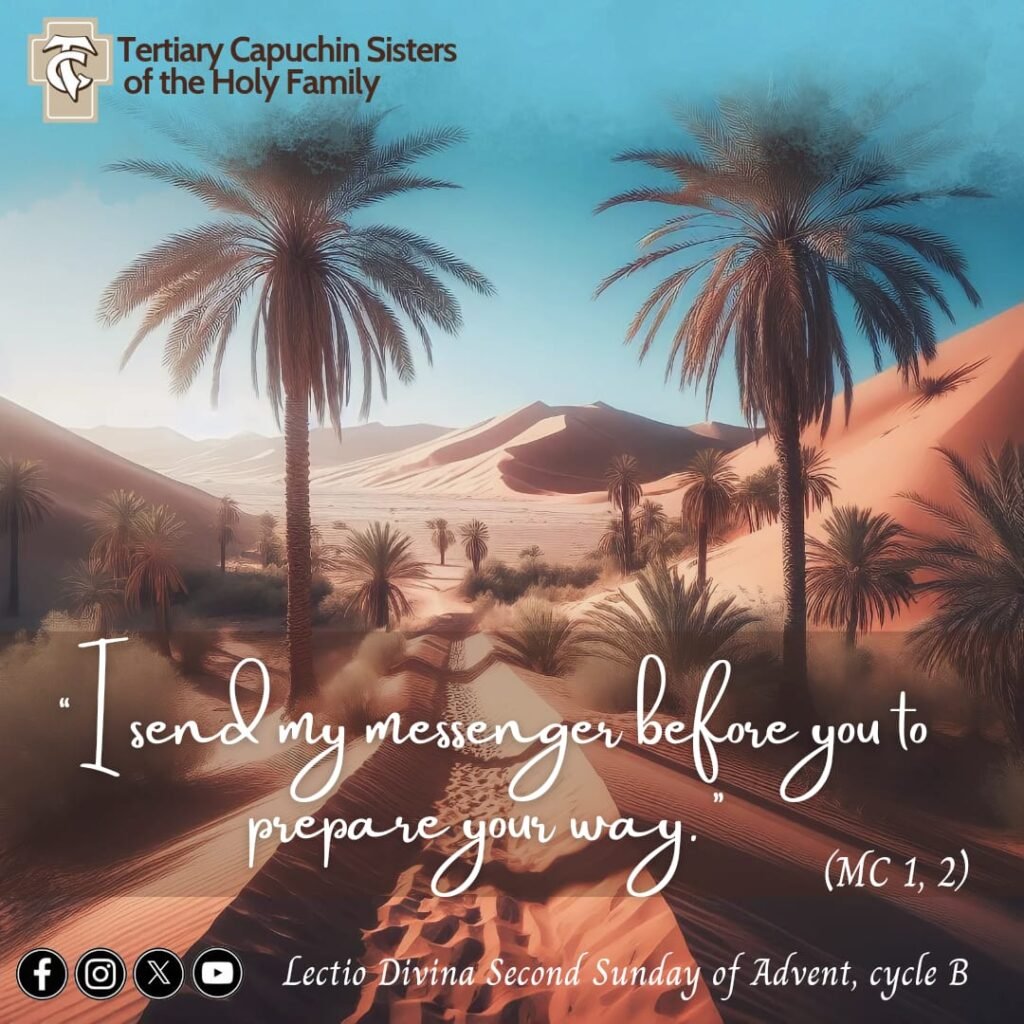A reading from the Prophet Isaiah Is 40:1-5. 9-11. «Comfort, comfort my people says the Lord.»
Psalm 84: «Show us your mercy, O Lord, and give us your salvation».
Second Letter of the Apostle St. Peter 3, 8-14.
Mark 1:1-8: A voice cries out in the wilderness: Prepare the way for the Lord,
During this Second Sunday of Advent Isaiah concretizes the mission of every prophet saying: «Comfort, comfort my people, says the Lord, speak to the heart of man». And from the first reading he presents John in an intrinsic way; he will define him as the voice crying in the wilderness, as the herald, the messenger. But at the same time he will reveal his dual mission: At first, we see him as a prophet who emerges in the complicated historical scenario to give us hope, and later as a prophet who demands a change of attitude. However, what is most important is the definition that the prophet and later the evangelist will provide of him, explaining the reason for his special presence at this time: «A voice crying in the wilderness: Prepare the way of the Lord, make straight his paths».
The entrance of the forerunner, of the Messiah on the stage of history is the theme of today’s Gospel, Luke leads us through a very clear itinerary in which he will present us the figure of John the Baptist from three direct references:
A look at the historical framework in which John began his ministry (3,1-2a).
The Gospel is clear, the work of John and Jesus takes place in a concrete historical context, where the figures of the rulers stand out. To this dominant power structure of the time a messenger is sent, that is why the intention of this second Sunday of Advent is to warn that God speaks through his forerunner who brings a double announcement, as we have already said. God enters history, he takes our side in the common circumstances of human life. The characters mentioned are directly or indirectly linked to the ministry of John and Jesus; their relationship with the authorities will be conflicting. A necessary but risky confrontation is John’s assignment.
We all know the cruel outcome of John’s mission and yet, the Gospel does not promote a negative attitude towards the power that silences the prophets with violent methods. The mention of these characters who wield destructive power seeks to convey good news: we are not completely surrendered to the historical powers, since the last word on the destiny of the world belongs to God, the Lord of history. With the coming of Jesus, whose path John the Baptist prepares, God breaks the iron cycle and the immovable course of the historical forces that oppress human beings by monopolizing everything, as we will see in more detail on the Third Sunday of Advent. Therefore, Jesus and the last of the prophets enter the scene closely linked to this story.
The presentation of the prophet’s vocation (3:2)
John is the voice crying out in the desert and it is worth pausing to take up this symbolism: The «desert» takes us back to the origins of the people of Israel in the exodus and even brings us back to the beginnings of history itself. The desert evokes aridity, solitude, anonymity, fear, insufficiency, lack of hope. In it we brush against death. The desert is the place where if you cry out, no one hears you; where if you fade away exhausted on the sand, there is no one to stand beside you.
What does it mean then to listen to the voice of God in the desert, to proclaim it also in the desert? It means that we must hear the inaudible and proclaim the unspeakable, overcoming all the impediments that would frustrate our mission and silence our proclamation.
And finally, a summary of the essence of John’s prophetic mission (3:3-6).
Our times are not different from John’s, we continue to have a deep need for conversion, and conversion means going back to retrace our false steps and affirm our footprints on the right path. John prepared the way of the Lord, more with his life than with his words, striving never to fall into the attitude of self-reference and giving Jesus his rightful place, first in his own life and then in history. To prepare the way is to leave everything ready for those who, along the same path, will arrive at the expected destination, and this should make us reflect: how are we traveling this path, which is life itself? Will our steps serve as a reference for others to reach a single destination, which is love, or, on the contrary, will our steps make them walk along confused and mistaken paths? Do we know how to discern which path to follow, or are we groping our way through life? God does not postpone his promises, as we heard in the second reading, he came to our land, to our history, to our family. How deep is our certainty and under what daily presences do we recognize God with us?
Let us be grateful for these presences and let us validate them in our own history. Maranatha!
S. Sandra Milena Velásquez B, tc




